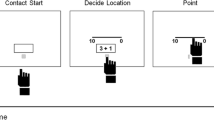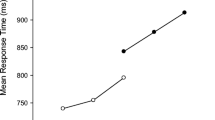Abstract
Current models of adult arithmetic performance assume that representation includes only facts and procedures. However, other kinds of representations such as an analog scale or sets of number multiples might be useful in a variety of multiplication-related tasks. Introducing the practice transfer paradigm, we demonstrate that associations between distinct representational structures can be detected via cross-task transfer, provided that initial performance is retrieval based. Results support the predictions of the integrated-structures model of multiplication knowledge. Implications for well-established item differences such as the problem-size effect are addressed, and the question of how integration occurs is considered.
Similar content being viewed by others
References
Anderson, J. A., Spoehr, K. T., & Bennett, D. J. (1994). A study in numerical perversity: Teaching arithmetic to a neural network. In D. S. Levine & M. Aparicio (Eds.),Neural networks for knowledge representation and inference (pp. 311–335). Hillsdale, NJ: Erlbaum.
Ashcraft, M. H. (1987). Children’s knowledge of simple arithmetic: A developmental model and simulation. In J. Bisanz, C. J. Brainerd, & R. Kail (Eds.),Formal methods in developmental psychology: Progress in cognitive development research (pp. 302–338). New York: Springer-Verlag.
Ashcraft, M. H. (1992). Cognitive arithmetic: A review of data and theory.Cognition,44, 75–106.
Banks, W. P., Fujii, M., & Kayra-Stuart, F. (1976). Semantic congruity effects in comparative judgments of magnitudes of digits.Journal of Experimental Psychology: Human Perception & Performance,2, 435–447.
Campbell, J. I. D. (1995). Mechanisms of simple addition and multiplication: A modified network-interference theory and simulation.Mathematical Cognition,1, 121–164.
Campbell, J. I. D., & Graham, D. J. (1985). Mental multiplication skill: Structure, process, and acquisition.Canadian Journal of Psychology,39, 338–366.
Cohen, J. [D.], MacWhinney, B., Flatt, M., & Provost, J. (1993). PsyScope: An interactive graphic system for designing and controlling experiments in the psychology laboratory using Macintosh Computers.Behavioral Research Methods, Instruments, & Computers,25, 257–271.
Dehaene, S. (1992). Varieties of numerical abilities.Cognition,44, 1–42.
Gallistel, C. R., & Gelman, R. (1992). Preverbal and verbal counting and computation.Cognition,44, 43–74.
Geary, D. C. (1996). The problem-size effect in mental addition: Developmental and cross-national trends.Mathematical Cognition,2, 63–93.
Hamann, M. S., & Ashcraft, M. H. (1986). Textbook presentations of the basic addition facts.Cognition & Instruction,3, 173–192.
LeFevre, J.-A., & Bisanz, J. (1986). A cognitive analysis of numberseries problems: Sources of individual differences in performance.Memory & Cognition,14, 287–298.
LeFevre, J.-A., Bisanz, J., Daley, K. E., Buffone, L., Greenham, S. L., & Sadesky, G. S. (1996). Multiple routes to solution of singledigit multiplication problems.Journal of Experimental Psychology: General,125, 284–306.
LeFevre, J.-A., Bisanz, J., & Mrkonjic, L. (1988). Cognitive arithmetic: Evidence for obligatory activation of arithmetic facts.Memory & Cognition,16, 45–53.
McCloskey, M., & Lindemann, A. M. (1992). Mathnet: Preliminary results from a distributed model of arithmetic fact retrieval. In J. I. D. Campbell (Ed.),The nature and origins of mathematical skills (pp. 365–409). Amsterdam: North-Holland.
Miller, K., Perlmutter, M., & Keating, D. (1984). Cognitive arithmetic: Comparison of operations.Journal of Experimental Psychology: Learning, Memory, & Cognition,10, 46–60.
Moyer, R. S., & Landauer, T. K. (1967). Time required for judgements of numerical inequality.Nature,215, 1519–1520.
Rickard, T. C., Healy, A. F., & Bourne, L. E., Jr. (1994). On the cognitive structure of basic arithmetic skills: Operation, order, and symbol transfer effects.Journal of Experimental Psychology: Learning, Memory, & Cognition,20, 1139–1153.
Siegler, R. S. (1988). Strategy choice procedures and the development of multiplication skill.Journal of Experimental Psychology: General,117, 258–275.
Todd, R. R., Barber, P. J., & Jones, D. (1987). The internal representation of number: Analogue or digital? In J. A. Sloboda & D. Rogers (Eds.),Cognitive processes in mathematics (pp. 142–156). New York: Oxford University Press.
Viscuso, S. R., Anderson, J. A., & Spoehr, K. T. (1989). Representing simple arithmetic in neural networks. In G. Tiberghien (Ed.),Advances in cognitive science (Vol. 2, pp. 141–164). Chichester, U.K.: Ellis Horwood.
Zbrodoff, N. J. (1995). Why is 9+7 harder than 2+3? Strength and interference as explanations of the problem-size effect.Memory & Cognition,23, 689–700.
Author information
Authors and Affiliations
Additional information
This research was conducted while C.F.M. was supported by an NSF predoctoral fellowship.
Rights and permissions
About this article
Cite this article
Manly, C.F., Spoehr, K.T. Mental multiplication: Nothing but the facts?. Mem Cogn 27, 1087–1096 (1999). https://doi.org/10.3758/BF03201238
Received:
Accepted:
Published:
Issue Date:
DOI: https://doi.org/10.3758/BF03201238




